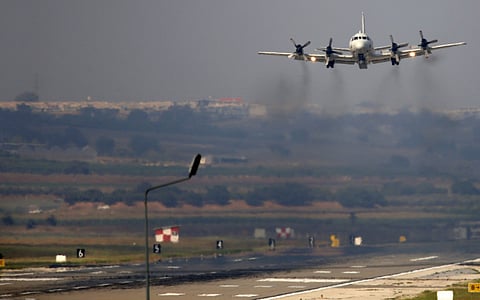Turkey’s two-front war may hurt US focus on Daesh
Ankara wants to see Bashar leave but fears an empowered Kurdish presence in Syria

Washington, D.C.: US pressure has finally brought Turkey to the frontline of the war on Daesh, but only at the risk of alienating another key member of the coalition.
The Syrian Kurds are among the few groups to have taken on the terrorists in ground combat and beaten them, and for that they’re counted useful allies in Washington. To the Turks, though, they are both enemy and threat - part of a wider Kurdish movement with ambitions for statehood and designs on Turkey’s southeast.
That divergence could undermine agreements reached this week to push Daesh out of border areas and let American jets use a nearby airbase for bombing raids. It also highlights how remote is the prospect of an end to a civil war that has devastated Syria and destabilized the Middle East. More than four years into the conflict, the United States and its main ally among Syria’s neighbors are still pursuing contradictory goals.
That could “perpetuate or exacerbate conflict in Syria and across the border,” said Anthony Skinner, head of analysis for the Middle East and North Africa at Britain-based forecasting company Verisk Maplecroft. Any move by Turkey to “weaken Syrian Kurds could well be exploited by Daesh,” he said, using the Arabic term for Daesh.
The difference in priorities was on display this week. The US said Monday it would use newly available airbases in Turkey to keep aiding the Kurds.
Days earlier, Turkish Prime Minister Ahmet Davutoglu had threatened to attack the same group of Kurds if they failed to align themselves with Turkish interests in Syria. Air support for the Syrian Kurds was not part of any deal with the US, Turkey’s Foreign Ministry said Wednesday.
Turkey launched its first air strikes against Daesh on Friday, after a suicide bomb attack in a border town. Its victims were mostly pro-Kurdish activists, and Kurdish groups carried out a string of reprisals, including the killing of policemen accused of being terrorist collaborators. A week of violence roiled markets, with the lira hitting a record low and stocks and bonds sliding.
The Turkish operation had a second front, though. Air strikes also targeted Kurdish rebels in northern Iraq who are close allies of the Syrian Kurds. In Turkey, a police roundup of militants netted six times as many people with Kurdish connections as terrorists.
Turkey has NATO’s second-biggest army, and its decision to join the attack on Daesh was hailed by US officials. On paper, the countries agree that the terrorist group must be stamped out and that, in due course, Syrian President Bashar Al Assad also has to go.
After Daesh’s rapid gains last year, though, Al Assad slid down the list of US priorities.
Turkey is training a force of “moderate” Syrian rebels that could fight Al Assad as well as Daesh, and says it wants to use them to create a “safe zone” in northern Syria.
“What we’re trying to do is clear Daesh,” a senior administration official said Tuesday. “It’s important not to confuse that with staking out these zones that you can identify with road signs and on big maps, and that’s just not what’s happening.”
Turkey has been accused by critics, including the Kurds, of turning a blind eye to Daesh and other terrorists because it was so eager to help anyone fighting Al Assad. The government denies aiding extremists.
“The US is seeking to contain and limit” Daesh while avoiding getting drawn further into the Syrian conflict, according to Shashank Joshi, a research fellow at the Royal United Services Institute in London. By contrast, Turkey sees the terrorist group as a problem that can only be solved by overthrowing Al Assad, he said.
Turkey points to the brutality of Al Assad’s government in repressing opposition and igniting a civil war that has left almost a quarter of a million dead. Turkey has admitted more than 2 million refugees at a cost of billions of dollars, and says it has received little help from Western allies with the aid effort.
For Turkey, another consequence of the war has been gains for the Syrian Kurds, as Al Assad’s army withdrew. After a series of victories against Daesh since last year, achieved with American air support, Kurds now control territory along two thirds of the border with Turkey, according to Skinner. Kurdish groups say it’s their successful experiment in self-rule that is Turkey’s real target.
Alongside the autonomy enjoyed by Iraqi Kurds, and gains for the Kurdish party in Turkey’s election last month, it adds up to a threatening prospect for Turkish rulers. That may be leading President Recep Tayyip Erdogan to abandon his own landmark policy of dialogue with Kurdish rebels.
Erdogan has to make electoral calculations too. In the June 7 vote, his allies lost ground to nationalists opposed to the peace process, as well as to the Kurds. The outcome was inconclusive and a repeat election may be needed soon.
For Turkey, there’s a bigger picture in which “Daesh is a distraction,” said Aaron Stein, a non-resident fellow at the Atlantic Council’s Rafik Hariri Center for the Middle East.
“The Kurds are part of a deeper problem, if they manage to consolidate their territory in Syria and even link up with Kurds in northern Iraq and separatists in Turkey,” he said.



